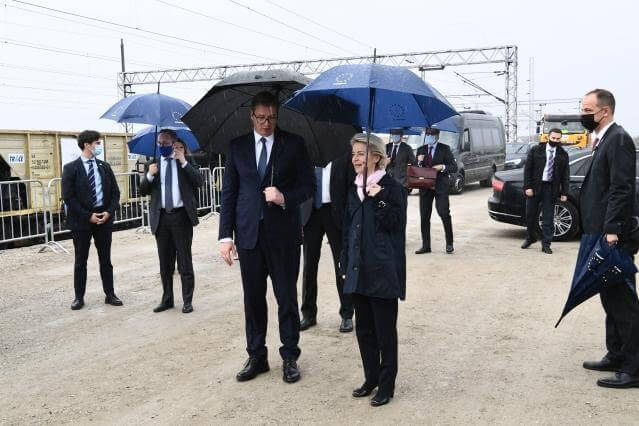If there were celebrations in Thessaloniki in 2003 due to the birth of the story about the inclusion of the Balkans in the European Union, a rather unhappy gathering on the occasion of coming of age can take place on Brdo near Kranj in a few days. At least that is what the European diplomats say, those who revealed to Reuters that after 18 years, the EU will no longer be able to guarantee membership to the countries of the Western Balkans.
There is no reason to think that they are talking by heart, nor to suspect that they have problems harmonizing the text of the final statement that will appear on October 6 at the EU-Western Balkans Summit in Slovenia. Again, we have every reason to expect that counter-Thessaloniki will not happen on Brdo near Kranj, that is, the withdrawal of the promise given 18 years ago.
However, this is, so far, the most serious putting in the worm of doubt into the project of enlargement of the Union to the Balkans. It arrived at a rather awkward moment for EU Prime Minister Ursula von der Leyen, in the middle of her tour of the Balkan capitals, where she must convince her hosts otherwise, that the Union remains open to the Balkans. Of course, we will believe her, because she speaks “first hand” and from the highest European function, but we cannot reject the stories of anonymous European diplomats given to Reuters as meaningless.
For a long time, and especially after Brexit 2016, the interest for the inclusion of new members into the Union has been falling sharply in the richer and more influential part of the EU. The former symbol of European superiority to gather everything that was behind the “iron curtain” has been reduced to hesitation to accept the Balkan post-conflict region, the zone that is the only one left to complete the long-established EU borders. For five years now, the question has been sullenly raised all over Europe – Great Britain has left us, and small Balkan countries are being offered as a replacement. This is the slogan of both left and right populists across Europe, politicians who do not cultivate love for the European Union at all, and over the years it has led to EU enlargement falling to the bottom of European priorities, and until just a decade ago it was at the top. Simply put, the story of EU enlargement to the Balkans has long failed to bring votes in the strongest European democracies and economies, in its West. However, why is it too early to take Reuters interlocutors, who are announcing the withdrawal of guarantees for the inclusion of the Balkans into the EU, seriously?
First of all, because it is too late to withdraw such a guarantee. The European Union is already deeply involved in the process of integrating (some) Balkan countries into its membership, there are not only verbal promises about that, but also contractual relations. This means that this process cannot be stopped by a single political declaration, which is now being prepared with great difficulty, but it requires much more serious work, and above all a political decision.
Secondly, by giving up the Balkans, the European Union, which is frantically looking for some foreign policy success in order to prove its vitality, would recognize its geopolitical impotence, and the same voters who do not want the Balkans in their society also resent it for it. It would admit to giving up on a job it had taken on itself, and gave it up because it took too long. By that logic, why would relations with distant lands, like Indochina, be more important than jobs in its own backyard, which it has already integrated economically, culturally, technologically, educationally, and finally politically.
Ursula von der Leyen was forced to deny the stories that Europe was giving up on the Balkans, and she did so convincingly. She didn’t even have to say anything, it was enough that together with the President of Serbia, Aleksandar Vučić, she opened up works on the railway and the highway from Niš to Albania, on projects that are mostly financed by the European Union. It is possible that some European diplomats think that the door is closed for Serbia and others in the Balkans to join the EU, but at the same time, European money is opening jobs worth millions for a corridor that will ease tensions over the most difficult political issue in the Balkans, Kosovo.
Donje Međurovo, a village in the tame South Morava Valley, near Niš, may be geographically halfway between Thessaloniki and Brdo near Kranj, but it can symbolically become an important toponym in the 18-year history of the Serbian and Balkan path to EU membership. For the first time in its history, it welcomed the Serbian president, and it is probably the first village outside the EU to host a president of the European Commission. It was a place where the EU Prime Minister praised Serbia and its President for all the reforms they have done (“You have made outstanding progress and taken courageous decisions. And I really want to commend you for that, I want to praise you for that.”), but it did not remain just on nice words. A concrete, visible and useful job has been opened, which will open huge opportunities for development to a large but underdeveloped part of Serbia and, ultimately, a fast lane for reaching a developed Europe.
Diplomats from the beginning of the story will probably measure every word for a long time and look for a way to please the different and often opposite attitudes of their bureaucracy and bosses from the countries they come from. But, the most accurate image of the future of Serbia in the EU will not come from Brussels or Brdo near Kranj, but from Donje Međurovo.
